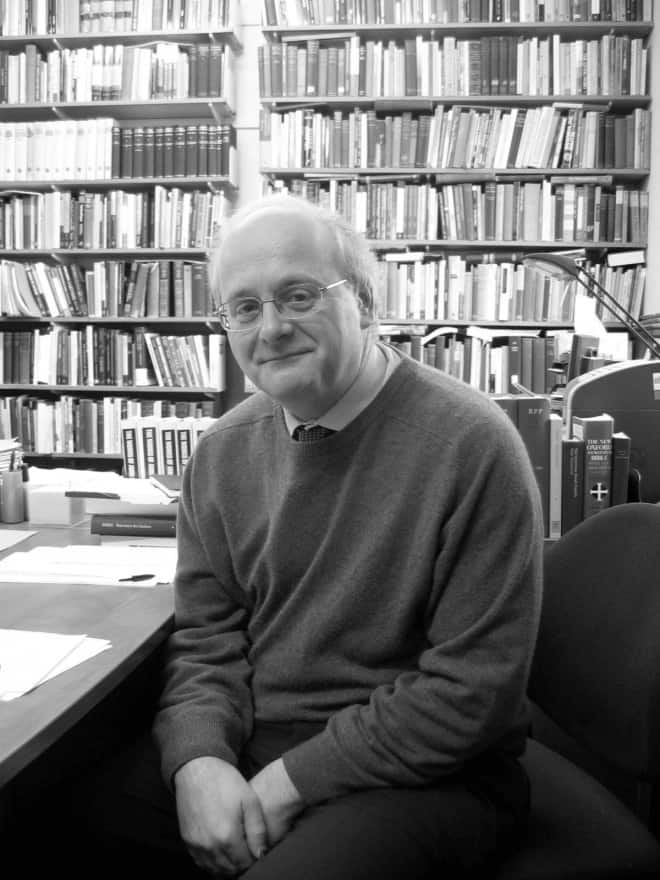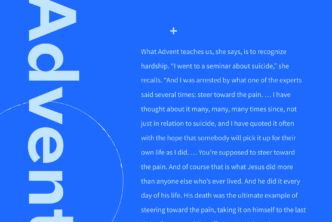On May 25, 2016, Professor John Webster, one of the world’s great contemporary theologians, suddenly and unexpectedly entered glory. Within hours memorials began to appear. Following his training at the Bradford Grammar School and the University of Cambridge (MA, PhD), Webster took his first teaching post at St. John’s College at the University of Durham. After four years he moved to North America where he spent a decade teaching at the University of Toronto. He returned to England in 1996 with an appointment to the prestigious Lady Margaret Professorship of Divinity at the University of Oxford, which he left in 2003 for the open spaces of Bonnie Scotland. In Scotland he served at the Chair of Systematic Theology at the University of Aberdeen until 2013 when he took up an identical post at the University of St. Andrews.
Many of the memorials have mentioned particular trait that characterized Webster: humility. He cared about his family, students, and colleagues more than academic accolades, which, although never sought, were plentiful. In the introductory chapter to The Cambridge Companion to Karl Barth, John Webster quoted from a speech Barth had given on the occasion of his eightieth birthday: “As a theologian one can never be great, but at best one remains small in one’s own way.” Those who knew Webster would agree this was indicative of him as well. But the God whom his theology celebrated is great, and for that reason Webster’s contribution is far from small.
As a positive theologian, Barth maintained that Christian theology was governed only by the reality that gave rise to it, namely, the God revealed in the gospel of Jesus Christ. It is the gospel that measures the speech of the church. So, when dogmatics ventures onto the critical path it does so as an ancillary and self-critical utterance, indicating the scope and vitality of the gospel within the Christian community that testifies to the reality of God. Webster took the point to heart; writing of his own theological program, he said: “Christian theology does not search out its object, still less create it for itself. Its originating context is the gospel which has already been uttered, in which God expounds his own presence and which is set out in the apostolic word. The task of theological reason is to pay constant and ever-fresh attention to that gospel, with a measure of focus and single-mindedness” (Confessing God).
With such an aim Webster was departing from the theological culture in which he and many other modern theologians had been trained, one which, according to him, suppressed constructive and positive dogmatics in favor of doctrinal criticism. Modern theology tended to approach its subject matter in light of the particular “problems faced by those who felt acutely responsible to do their theology under the bleak searchlights of what were taken to be normative modern intellectual developments” (“Discovering Dogmatics,” in Shaping a Theological Mind). The theological agenda was being set by something other than God himself. Of course, the human work of theology is a creaturely activity, but “the matter of the gospel is not; even as it announces itself increasingly in creaturely forms, the matter of the gospel is God” (Word and Church).
We have surveyed the major marks of Webster’s métier, yet it is important to know that he was not cloistered in the ivory tower. As a church theologian it was important for him to be involved in the church’s life. During his training at Cambridge he participated in the Christian Union, and from the moment his teaching ministry began he engaged in preaching. His posting at Oxford brought with it appointment as a residentiary canon of Christ Church Cathedral. And he would occasionally deliver messages at chapel services at the universities of Aberdeen and St. Andrews. Preaching he said was “one of the principal ways in which the God of the gospel has dealings with us. The gospel’s God is eloquent: he does not remain locked in silence, but speaks. He does this supremely in the mission of the Son of God, the very word of God who becomes flesh, communicating with human creatures in human ways, most of all in human speech” (Confronted by Grace). Jesus came as a preacher and charged his followers to preach, to carry forth the gospel from and about him. For “[p]reaching is not any sort of public Christian discourse,” attested Webster, “it is the church saying something about the words of this text [holy scripture], on the basis of the words of this text, under this text’s authority, direction and judgment. … The sermon repeats the scriptural word in other human words, following the Word’s movement and submitting to its rule. In this the sermon assists in the work of the divine Word, which builds up the church, making its life deep, sturdy and vital” (Confronted by Grace).
John Webster was an example of dignity, charity, kindness, and humility. Whether chatting about the classics of literature, music, and art, sharing a pint, or cracking jokes, no one would have ever known they were in the presence of one of the world’s leading theologians, for he neither drew attention to his gifts nor pointed out the shortcomings of others. Rather, his aim was to create a Christian theological community, where gracious camaraderie ruled, rather than cutthroat competition. For those who worked alongside him or studied under his tutelage, his departure means the loss of an intellectual father and loving friend. He left several theological projects unfinished; we shall never know the impact they would have had on the church’s reading of the gospel. Yet John Webster’s greatest legacy is not the ink written in books, but the impact made on lives of those who will try to make up the considerable slack he has left in his departure.
* * *
This blog post was written by Daniel Bush, author and former student of John Webster. For a comprehensive survey of Webster’s theological contributions and career, see this blog post on the Lexham Press Blog.





